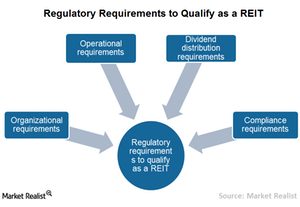What Are the Regulatory Requirements to Qualify as a REIT?
To qualify as a REIT, a company must make REIT election by filing a Form 1120-REIT with the IRS. This is essential to reduce or eliminate corporate tax.
Aug. 24 2015, Published 3:57 p.m. ET

Basic requirements
In order to qualify as a REIT, an entity must satisfy a number of requirements within the Internal Revenue Code. These provisions are related to organizational structure, operation, distribution, and compliance. In this part, we’ll discuss the major requirements that are mandatory to qualify as a REIT like Simon Property Group (SPG), Ventas (VTR), and Equity Residential (EQR).
Organizational requirements
- A REIT must be formed in any of the states as a corporation taxable for federal purposes, but for its REIT status.
- It must be managed by a board of directors or trustees and its shares must be transferable.
- A REIT should have a minimum of 100 shareholders from its second year of operations.
- A REIT should have no more than 50% of its shares held by five or fewer individuals during the last half of the taxable year.
Operational requirements
- A REIT must derive at least 75% of its gross income from real estate-related sources. An additional 20% must be from the real estate sources or other forms of income such as dividends and interest from non-real estate sources.
- Non-qualifying sources, like service fees or a non-real estate business, shouldn’t constitute more than 5% of a REIT’s income.
- A REIT must invest at least 75% of its total assets in real estate.
- A REIT can’t own more than 10% of the voting rights of any corporation other than another REIT, a TRS (Taxable REIT Subsidiary), or a QRS (Qualified REIT Subsidiary). In addition, a REIT can’t own stock in a corporation—other than a REIT, TRS, or QRS—in which the stock value comprises more than 5% of a REIT’s assets.
- The stock value of a REIT’s TRS shouldn’t comprise more than 25% of the REIT’s assets.
Dividend distribution requirements
- A REIT must pay at least 90% of its taxable income as a dividend to shareholders annually. On retaining income, it must pay taxes just like any other corporation.
Compliance requirements
- To qualify as a REIT, a company must make REIT election by filing a Form 1120-REIT with the IRS. This is essential to reduce or eliminate corporate tax and avoid double taxation of shareholders income.
- A REIT must mail annual letters to its shareholders requesting details of beneficial ownership of shares. There are significant penalties if it fails to do so on time.
Investors looking for diversification in the REIT sector can get exposure to REIT ETFs like the Vanguard REIT ETF (VNQ), the iShares U.S. Real Estate ETF (IYR), and the iShares Cohen & Steers REIT ETF (ICF).
